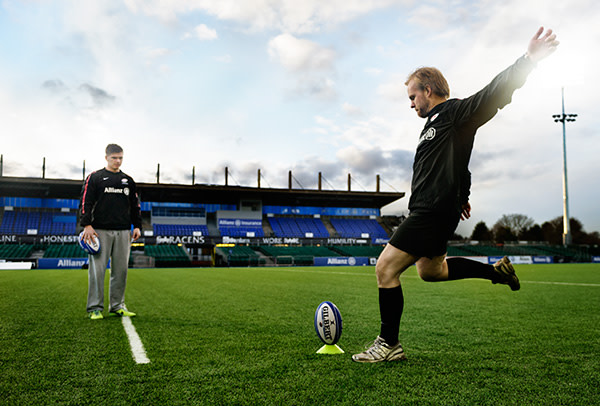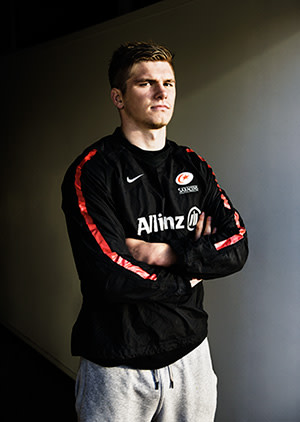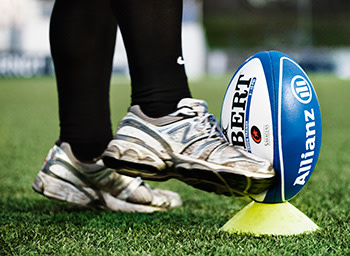FT Masterclass: Goal kicking with Owen Farrell

Simply sign up to the Life & Arts myFT Digest -- delivered directly to your inbox.
Chuck a rugby ball at any schoolboy player and he will invariably have a crack at kicking for goal. I know I used to. Despite playing second row – one of the last positions in which kicking is required – for my school first XV, my county under-14s and, later, for my college team at university, I was always trying to master goal kicking.
There is something about kicking in such a carefully choreographed team sport as rugby that is so enticing. It is the individual heroism of slotting a perfectly struck ball between the posts from 30 yards as the stadium erupts and your team wins by the slimmest of margins that leads everyone to want to have a go.
The reality whenever I tried to kick was rather less emphatic. The ball always shot off in an unintended direction, my teammates looked at their boots and the coach, head in hands, could be heard muttering: “Why did you kick? Why did you kick? You’re not a kicker . . .”

It is a comment I try to put out of my mind as I step on to the pitch at Allianz Park, Saracens’ ground in north London, for a kicking lesson with the team’s 22-year-old wunderkind, Owen Farrell. It is a freezing day, the low sun casting dramatic shadows. The Saracens have just finished a training session before their pre-Christmas match against Leicester Tigers and the ground is deserted.
Farrell, who has attracted the nickname Ice Man among headline writers for his cold, calculating style, grew up playing rugby league in Wigan where his father Andy was the local team’s star player. Ever since he could run around he has been kicking a rugby ball, he tells me, but it was at about seven or eight that he started playing properly. Then, when he was 13, he rather unwillingly switched to rugby union after his father gave up league, moved south and started playing union for Saracens and England.
At 17, Farrell became the youngest player in English professional rugby union when he pulled on a Saracens shirt. He has never looked back. Farrell senior retired in 2009 to coach the team and is now an England coach. Did his dad offer any advice before that first international against Scotland in the 2012 Six Nations?
“We constantly talk about that sort of stuff,” says Farrell. “It’s not just the big game or the first time, it’s what we do, sit down and have a chat. He always asks me what I’m thinking before a game and what I’m going to concentrate on.”
Were there any nerves? Playing for your country is a big step, after all, even if your father has done it too. “There was a bit of nerves leading up to it,” says Farrell in a way that makes you wonder whether he really knows what being nervous feels like. “When you’re sat in your room on your own the night before – that was a bit nerve-racking. But once you get on the field and realise it’s just a game, you get excited.”
When the Six Nations championship begins next Saturday, it is Farrell who will take on the kicking duties for England. Where Jonny Wilkinson’s famously constipated kicking style was all funny breathing and that strange handclasp, Farrell has a more relaxed approach.
Earlier, I had watched as Farrell practised kicking. On the touchline, he had paused, then straightened and ambled forward. I had assumed he had decided not to kick but then he suddenly plugged the ball effortlessly between the posts.
His relaxed, easy poise belies hours of practice. Farrell gives himself one day off a week from kicking and will always kick the day before a game. By contrast, I’ve not kicked a ball for 15 years. Yet the dangerous thing about watching someone really, really good at something do that thing with such nonchalance is that it makes you almost believe you could do it too.
“Let’s see what you’ve got,” he says in that blunt Wigan accent when I join him on the pitch.
I can do this. I set up the ball on a cone (the pitch is artificial), then take a few paces back and a couple to the side as Farrell had. I look at the posts, then at the ball, run up and strike. In my mind, the ball is already soaring neatly into the darkening sky. In reality it barely gets off the ground, dribbling away pathetically.
Farrell asks which bit of my foot I am striking with and suggests an adjustment. “I always set up the ball, then walk straight back to see if it’s in line,” he says. He points out that I am coming in behind the ball and scooping it. I need to be practically over the ball when I kick. “Find your spot, then lead with your kicking foot to the front of the ball so you end up over the ball,” he advises.
I kick again. Better, but only marginally. “You’re leaning back but you want to get over the ball,” he says again. “I try to stand upright – it’s one of my things. I give myself some space and my body’s as upright as possible.”

Overthinking it now, I can’t work out whether to watch the ball or the posts as I kick. “I look up, pick my spot – even if it’s a bit of cloud – and focus on it,” says Farrell. “Then I look from the ball to the point and draw a line so that I know that’s where I’m going to kick the ball. Then as I come in, I look at the ball.”
I try it with more momentum this time. The ball traces a neat loop through the posts and I am elated. Farrell gives me some words of encouragement. “Back yourself,” he says – a simple mantra but surprisingly hard to do.
“A good thing I learnt when I started playing,” he adds, “was that it doesn’t matter what’s happened in the past in a game. You’ve got a job to do straight away, so I’ll always back myself and switch on to the next thing.”
We try a few more kicks. With each one he offers some subtle fine-tuning. “Two things you need to remember: get to the front of the ball and keep your left shoulder forward,” he says as we set up another kick.
Thwack! “Better, a lot better.” I hit another, feeling cocky now. “The best one by a mile.”
I ask him what his longest successful kick was. “With the wind behind me,” he says, “probably 55 yards.”
“How far is this?” I ask gesturing at my cone sitting squarely in front of the posts. “About 25 yards?” He laughs and points behind us: “That’s the 22 metre line.” I am kicking barely 12 yards.
From the other side of the pitch, I hear shouting. A small group of players has appeared and is heckling me. It is not quite the tens of thousands of French fans who will shout down every kick Farrell makes at the Stade de France in Paris but it is a hint of what it must be like to kick under pressure.
I try to remember what I’ve been taught. I think: “Back yourself.” I strike, the ball goes over cleanly and a cheer goes up. It’s unlikely to happen again so I take a bow. I might not be a kicker – but I have proved I can kick.
——————————————-
England play France at the Stade de France at 6pm on Saturday February 1. Owen Farrell plays for Saracens, which are sponsored by Allianz Insurance. www.allianz.co.uk
Comments